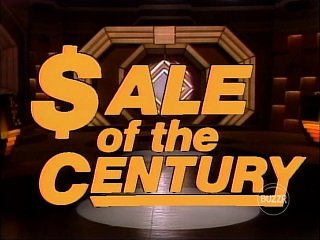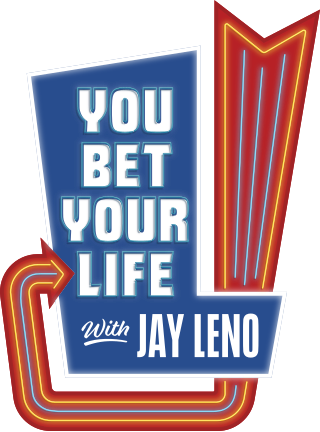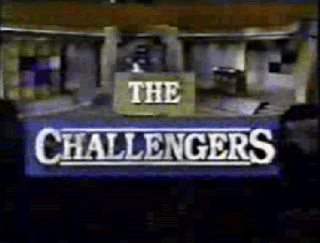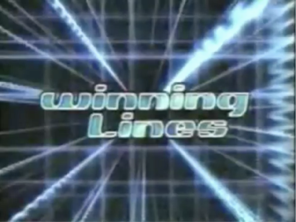
Press Your Luck is an American television game show created by Bill Carruthers and Jan McCormack. The show features contestants answering trivia questions to earn "spins" on a randomly-generated game board with 18 slides. Spaces on the board correspond to cash, prizes, and the show's mascot, a cartoon creature known as the Whammy. Landing on the Whammy eliminates any cash and prizes accumulated while also displaying a short comedic animation. Its format is a revival of an earlier Carruthers production, Second Chance, which was hosted by Jim Peck and aired on ABC in 1977. The original version of Press Your Luck aired on CBS between 1983 and 1986. This version featured Peter Tomarken as host, Rod Roddy as announcer, and Carruthers as both director and the voice of the Whammy.

Card Sharks is an American television game show. It was created by Chester Feldman for Mark Goodson-Bill Todman Productions. The game features two contestants who attempt to predict the outcome of survey questions to gain control of a row of oversized playing cards, then determine whether the next card drawn is higher or lower. The title Card Sharks is a play on the term "card sharp", a person skilled at card games.

Supermarket Sweep is an American television game show. The format combines an ordinary team-based quiz show with the novel concept of a live, timed race through a supermarket. In the timed race, cameras follow the teams with shopping carts through a large vacated supermarket with several aisles; the value of items thrown into the cart determine the winning team. The original show was broadcast on ABC from December 20, 1965, to July 14, 1967. Later seasons aired on Lifetime from February 5, 1990, to June 16, 1995, and later from April 3, 2000, to May 23, 2003, with reruns airing until March 26, 2004. Another version of the show aired from October 18, 2020, to January 30, 2022, also on ABC.

Sale of the Century is an American television game show that originally debuted on September 29, 1969, on NBC daytime. It was one of three NBC game shows to premiere on that date, the other two being the short-lived game shows Letters to Laugh-In and Name Droppers. The series aired until July 13, 1973, and a weekly syndicated series began that fall and ran for one season.

Hot Potato is a television game show that was broadcast on NBC in the United States from January 23 to June 29, 1984. From April 23 until its conclusion, the show was known as Celebrity Hot Potato.

You Bet Your Life is an American comedy quiz series that has aired on both radio and television. The original and best-known version was hosted by Groucho Marx of the Marx Brothers, with announcer and assistant George Fenneman. The show debuted on ABC Radio on October 27, 1947, moved to CBS Radio debuting October 5, 1949, and went to NBC-TV and NBC Radio on October 4, 1950. Because of its simple format, it was possible to broadcast the show on both radio and television but not simultaneously. Many of the laughs on the television show were evoked by Groucho's facial reactions and other visual gimmicks; the two versions were slightly different. The last episode in a radio format aired on June 10, 1960. The series continued on television for another year, recording a season on September 22, 1960 with a new title, The Groucho Show.
The Joker's Wild is an American television game show that aired at different times between 1972 and 2019. In the show, contestants answer questions based on categories determined randomly by a mechanism resembling a slot machine. The show's title refers to the game's slot-machine mechanism also having jokers.

Chain Reaction is an American television game show created by Bob Stewart, in which players compete to form chains composed of two-word phrases.

The Challengers is an American game show that aired in syndication from September 3, 1990 until August 30, 1991. The show remained in production for its entire run on the air, differing from most syndicated game shows which usually wrapped in the early summer.

Dream House is an American game show that saw contestants competing to win, as the title of the show indicates, a new house. The show originally premiered in primetime on ABC on March 27, 1968, with a daytime edition premiering on April 1, 1968. The primetime series aired weekly until September 19, 1968 and the daytime series aired daily until January 2, 1970, when it was replaced with All My Children. The daytime series was revived for NBC's daytime schedule and premiered on April 4, 1983, running until June 29, 1984.

Game Ka Na Ba?, formerly Pilipinas Game Ka Na Ba is a Philippine game show created by ABS-CBN. The main goal of the game is to win 2 million pesos by answering trivia questions.
Illinois Instant Riches is a lottery game show airing in the state of Illinois, as well as nationally on Chicago-based Superstation WGN-TV. The show was hosted by Mark Goodman, with Linda Kollmeyer as his co-host and Bill Barber as announcer.

Miljoenenjacht, officially Postcode Loterij Miljoenenjacht, is a Dutch game show, sponsored by the country's postcode lottery, where a contestant and at-home viewer could win up to €5,000,000 or as little as €0.01. The show is broadcast at various times, spanning across six episodes for each set. The program was originally shown by TROS on NPO 2, but moved to creator John de Mol's channel Tien in 2005. After the channel was discontinued after its sale to the RTL Group, the program moved to RTL 4. In 2019, the program moved to SBS6 due to the transfer of Linda de Mol from RTL to SBS.
Eén tegen 100 is a Dutch game show that has been airing since 3 September 2000 on various channels with Caroline Tensen as host. The game pits a single contestant against 100 other people for a chance to win a larger cash prize. It is sponsored by the Nationale Postcode Loterij.
The (£1,000) Pyramid Game is a United Kingdom game show based on the American format of the same name that was originally shown on ITV from 1981 to 1984 then 1989 to 1990 hosted by Steve Jones, then revived by Challenge in 2007 hosted by Donny Osmond.

Bingo America is an American game show broadcast by Game Show Network. The series follows two contestants as they try to compete to win up to $100,000. Additionally, the series lets at-home viewers print bingo cards online that allow them to play along with the show to win small amounts of money for themselves.

Winning Lines is an American game show that aired from January 8, 2000, to February 18, 2000, the day after its official cancellation. Adapted from the British format of the same name created by David Briggs, Mike Whitehill and Steven Knight, it was considered as CBS's answer to the success of ABC's Who Wants to Be a Millionaire. Winning Lines was hosted by Dick Clark, directed by James Yukich and produced by Stone Stanley Entertainment in conjunction with the British production company, Celador. The announcer for the program was Chuck Riley.

BrainRush is a live-action game show on Cartoon Network, hosted by Lamorne Morris and, to a lesser extent, Sarah Karges. It first aired on June 20, 2009, with its last episode airing on July 22, ending after one season.
Gefragt – Gejagt (Asked—Chased) is a quiz show that has been broadcast on German television since 2012. It is the German adaptation of ITV's show The Chase.













